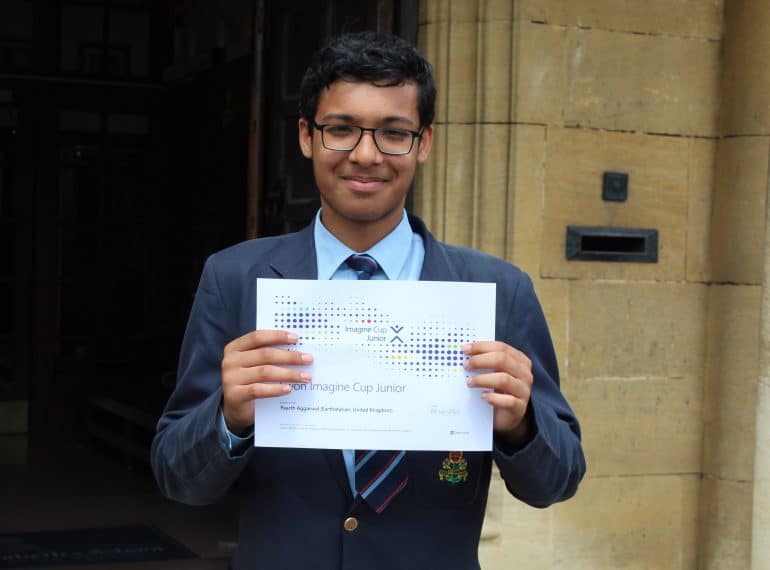
Paarth Aggarwal is among just ten global winners of the Microsoft Imagine Junior Cup after dazzling judges with his AI-powered application to reduce food waste.
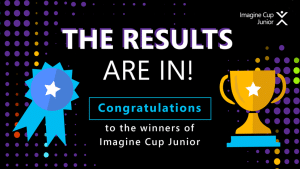 The competition, which challenged participants to submit creative ideas to solve some of the planet’s biggest issues using the power of artificial intelligence (AI), attracted thousands of entries from around the world.
The competition, which challenged participants to submit creative ideas to solve some of the planet’s biggest issues using the power of artificial intelligence (AI), attracted thousands of entries from around the world.
Year 8 pupil Paarth was the only winner from the UK, with the judges praising the detailed analysis he provided of how ‘deep learning’ was leveraged in the design of his app.
Headmaster Neil Enright said: “I congratulate Paarth on this impressive achievement, especially as he was one of the younger entrants in a competition open to 13–18 year-olds. Whilst many of the other participants entered as teams, Paarth took part as an individual, making this success all the more remarkable.”
Paarth entered under the ‘team’ name Earthatarian and conceptualised an AI-powered app that would reduce food waste by predicting the actual expiry of stocked food items and monitoring food consumption. As required by the competition, he used Microsoft APIs. (Application programming interfaces [APIs] enable computer programs to communicate with each other.)
“I was exultant to win, especially as it was the first time I have entered such a competition,” he said.
He explained why he chose food waste as the issue he wanted to tackle.
“I was very annoyed – and intrigued – about food waste. Lots of the food we buy we never eat. In many countries, there are lots of people who don’t have much to eat, whilst we do in the West,” said Paarth. “The aim is all about efficiency. Food waste plagues the world – it is not talked about enough.”
His app-based solution to this problem was to utilise cameras and sensors in people’s fridges and rubbish bins to see how much they are wasting. The app would use machine-learning to tell people the actual expiry date of food – judging freshness to predict when it would be at a point that it would no longer be safe to eat.
“This is to tackle consumer confusion around ‘use by’ and ‘best before dates’,” added Paarth. “The app would also look at patterns of consumption and recommend recipes based on this. It could also calculate calories using Bing API [using Microsoft’s search engine technology] and then recommend what people should buy.”
The judges said that with “so many amazing projects” they had a difficult task on their hands picking the top ten. They chose winners from countries as far apart as Nepal, Australia and the USA.
As well as receiving a trophy and a certificate, Parth won a prize worth $300.
In addition to being impressed by the Earthatarian project as a whole, they specifically praised Paarth’s thoughtful approach in using an AI-powered application to predict the ‘actual expiry’ of stocked food items and monitor food consumption, the presentation of his entry (which included a ten-slide electronic presentation and a video), and the thoroughness of his research.
Paarth says he’s “a believer in AI” and can see its potential to help tackle major problems. He plans to enter this competition again next year and then get involved with similar initiatives when older (the Apple and Google equivalents being open to those aged 16 and over).
His next project is to work on Amazon’s AWS DeepRacer – a machine-learning model aiming to get round a track as fast as possible.

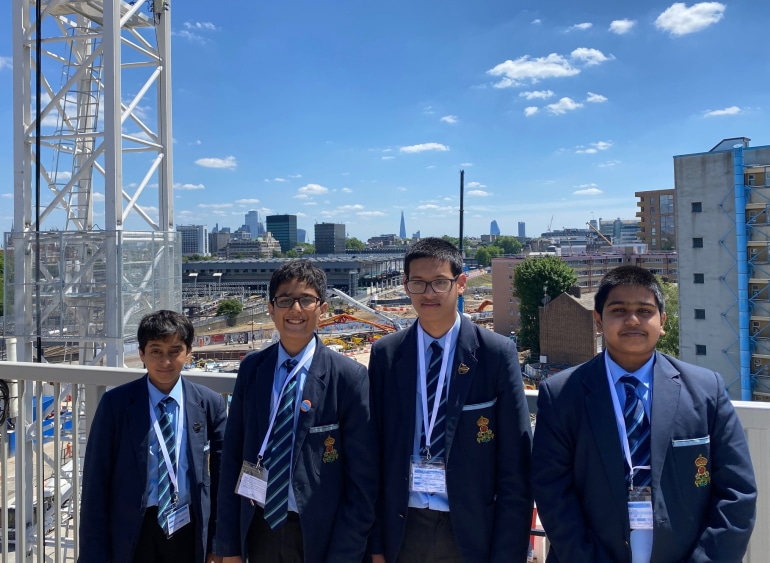
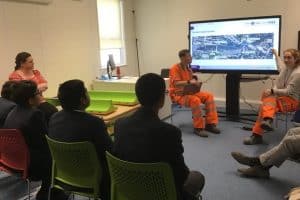 In the event, their visit was to one of the UK’s biggest current civil engineering sites. Euston Station will be the London terminus for HS2 and will double the seat capacity for trains leaving Euston during peak hours. The plans include a ‘seamless’ connection between the Northern, Victoria, Circle, Hammersmith and City and Metropolitan lines at Euston. The project forms part of a regeneration scheme in central London spanning 60 acres.
In the event, their visit was to one of the UK’s biggest current civil engineering sites. Euston Station will be the London terminus for HS2 and will double the seat capacity for trains leaving Euston during peak hours. The plans include a ‘seamless’ connection between the Northern, Victoria, Circle, Hammersmith and City and Metropolitan lines at Euston. The project forms part of a regeneration scheme in central London spanning 60 acres. “The trip to HS2 was fascinating and gave me a very useful insight into the day-to-day life of a civil engineer,” said Snehal. “I also learned how they impact our lives everyday by improving transport networks throughout the UK.’
“The trip to HS2 was fascinating and gave me a very useful insight into the day-to-day life of a civil engineer,” said Snehal. “I also learned how they impact our lives everyday by improving transport networks throughout the UK.’ 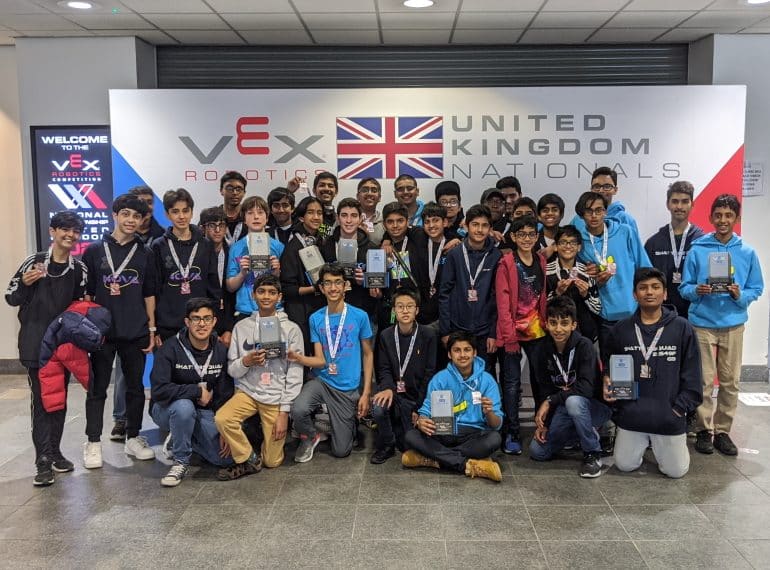
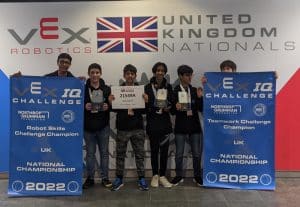 The six junior teams also won a slew of the top awards, following in the footsteps of the senior VRC teams who had similarly taken awards in their competition over the previous two days.
The six junior teams also won a slew of the top awards, following in the footsteps of the senior VRC teams who had similarly taken awards in their competition over the previous two days.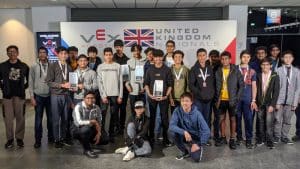 Four teams – two from Year 10, one from Year 12 and one with a mix of boys from the two year groups – competed in the senior VRC bracket at Telford International Center. HYBRID, Vortex Invicta, HEX Green and Hyperion pitted their wits against the very finest robotic talent in the UK. The VRC championships drew 58 teams from all over the UK to battle it out in the competition’s Brunel and Lovelace divisions.
Four teams – two from Year 10, one from Year 12 and one with a mix of boys from the two year groups – competed in the senior VRC bracket at Telford International Center. HYBRID, Vortex Invicta, HEX Green and Hyperion pitted their wits against the very finest robotic talent in the UK. The VRC championships drew 58 teams from all over the UK to battle it out in the competition’s Brunel and Lovelace divisions.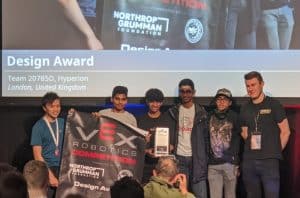 “Hyperion reached the Brunel divisional finals, while an all-QE alliance of HEX Green and HYBRID made it to the Lovelace division semi-final, only to be cruelly denied a finals place by a loose battery connection. The day was not over for QE teams, however: when the medal winners were announced, Hyperion won the coveted Design Award (considered the second-most prestigious in the whole competition), HEX Green achieved double success, winning both the Skills and Think awards, and Vortex Invicta received a Judges Award. “Vortex Invicta’s first award of the season thus arrived at the highest level of competition they had so far faced!” Mr Noonan said.
“Hyperion reached the Brunel divisional finals, while an all-QE alliance of HEX Green and HYBRID made it to the Lovelace division semi-final, only to be cruelly denied a finals place by a loose battery connection. The day was not over for QE teams, however: when the medal winners were announced, Hyperion won the coveted Design Award (considered the second-most prestigious in the whole competition), HEX Green achieved double success, winning both the Skills and Think awards, and Vortex Invicta received a Judges Award. “Vortex Invicta’s first award of the season thus arrived at the highest level of competition they had so far faced!” Mr Noonan said.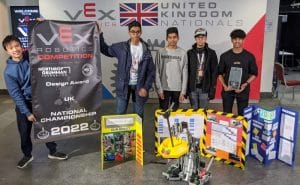 The achievements began with Gearsquad posting an early National Record Skills score. After strong QE performances in the Qualification and Skills elements of the competition, all eyes turned to the finals. The alliances (15 pairs from the 30 teams taken part) faced off in reverse order, from lowest to highest ranked, and the ‘Chair of Champions’ was unveiled – a seat reserved for the (current) highest-ranked teams.
The achievements began with Gearsquad posting an early National Record Skills score. After strong QE performances in the Qualification and Skills elements of the competition, all eyes turned to the finals. The alliances (15 pairs from the 30 teams taken part) faced off in reverse order, from lowest to highest ranked, and the ‘Chair of Champions’ was unveiled – a seat reserved for the (current) highest-ranked teams.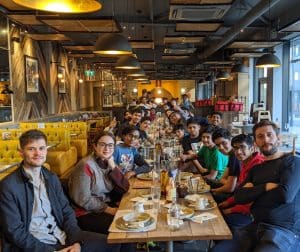 They also gained the following awards:
They also gained the following awards: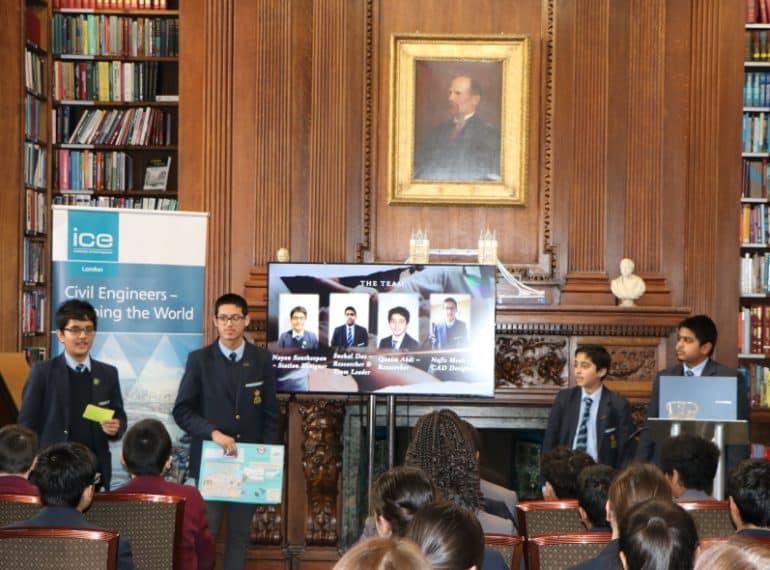
 The four Year 8 boys included no fewer than four different ways of reducing carbon emissions in their design for the new station connecting the Isle of Dogs to the O2 Arena in Greenwich.
The four Year 8 boys included no fewer than four different ways of reducing carbon emissions in their design for the new station connecting the Isle of Dogs to the O2 Arena in Greenwich.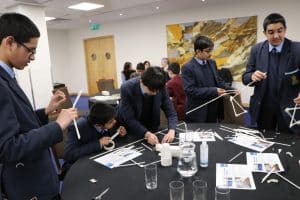 Jonathan Baggs, Director of ICE London, said that West Ferry was “very creative in its approach to energy generation and how it is used to operate the station”.
Jonathan Baggs, Director of ICE London, said that West Ferry was “very creative in its approach to energy generation and how it is used to operate the station”.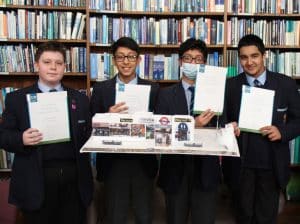 Kirsten Evans, a Technology technician and the organiser of the I Can Engineering Club at the School, congratulated all the boys who participated. “The club has allowed all 20 students involved to develop a better understanding of civil engineering’s role in society.”
Kirsten Evans, a Technology technician and the organiser of the I Can Engineering Club at the School, congratulated all the boys who participated. “The club has allowed all 20 students involved to develop a better understanding of civil engineering’s role in society.”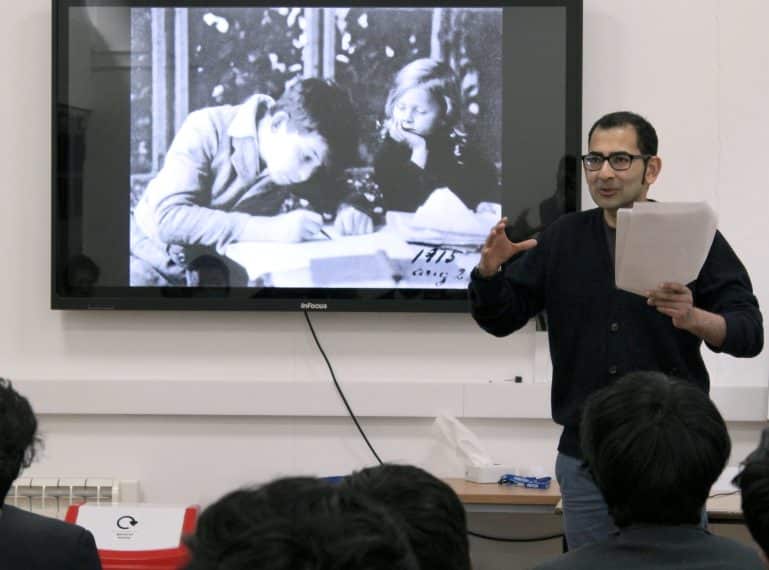
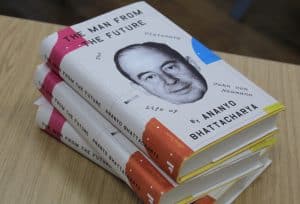 Dr Bhattacharya’s book, entitled The Man from the Future: The Visionary Life of John von Neumann, was named a Financial Times and Times Literary Supplement Book of the Year in 2021.
Dr Bhattacharya’s book, entitled The Man from the Future: The Visionary Life of John von Neumann, was named a Financial Times and Times Literary Supplement Book of the Year in 2021.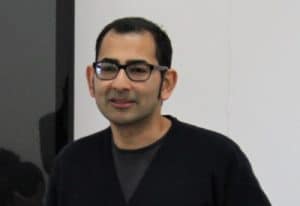 In his talk, Dr Bhattacharya mentioned the Manhattan Project as well as, inter alia, von Neumann’s contributions to set theory, game theory and the development of the first programmable digital computer.
In his talk, Dr Bhattacharya mentioned the Manhattan Project as well as, inter alia, von Neumann’s contributions to set theory, game theory and the development of the first programmable digital computer.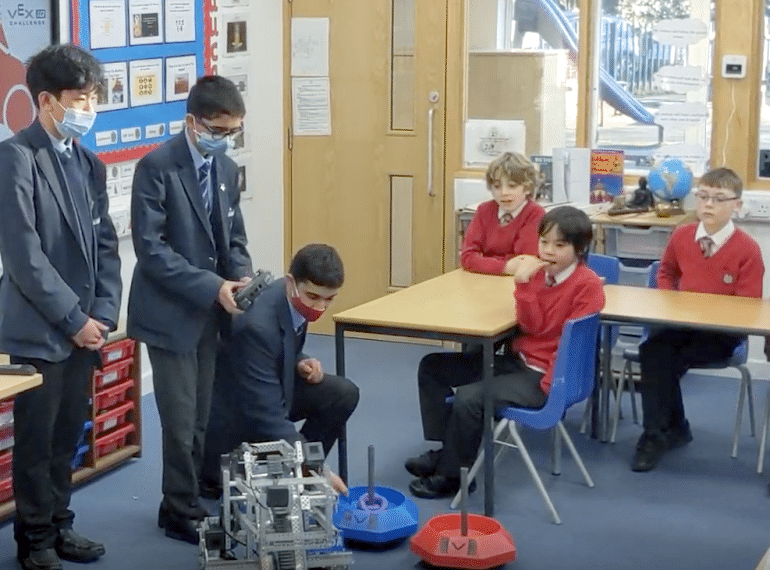
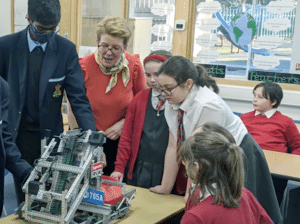 First, QE donated 3D printers to Northside Primary in North Finchley and Foulds School in Barnet, sending along a group of sixth-formers to help set the machines up and explain how they can be used.
First, QE donated 3D printers to Northside Primary in North Finchley and Foulds School in Barnet, sending along a group of sixth-formers to help set the machines up and explain how they can be used.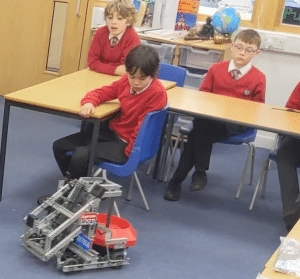 Mr Noonan accompanied senior boys from Team Hybrid – one of four senior QE robotics teams to have taken part in last year’s international VEX robotics finals – to Monkton Hadley.
Mr Noonan accompanied senior boys from Team Hybrid – one of four senior QE robotics teams to have taken part in last year’s international VEX robotics finals – to Monkton Hadley.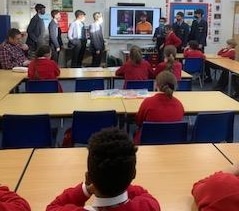 The children from Monken Hadley gave their own account in their school newsletter: “These robots were amazing…[The QE boys] play in many different competitions; the robot they are using…is so cool. It has a small conveyor belt, where rings go up, and it also collects big circles with poles on them.”
The children from Monken Hadley gave their own account in their school newsletter: “These robots were amazing…[The QE boys] play in many different competitions; the robot they are using…is so cool. It has a small conveyor belt, where rings go up, and it also collects big circles with poles on them.”